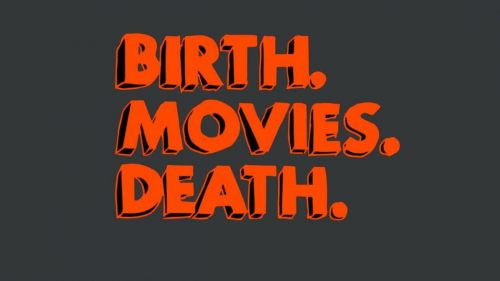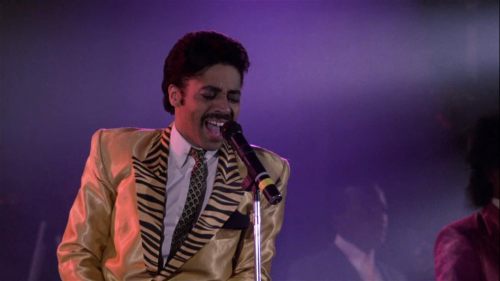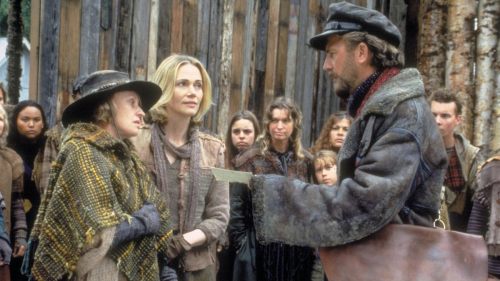Do You Want Him?: PURPLE RAIN’s Pure Performance
This piece was originally published in the April 2014 issue of Birth.Movies.Death. magazine.
Given Prince Rogers Nelson’s penchant -- or perhaps gift -- for mystery, even those who know Prince best aren’t totally sure how much of Purple Rain is based on actual events from his life. But the film’s mythologizing of its star is so thorough, so convincing, and perhaps most importantly so compelling, that all of it feels absolutely true. Simultaneously breaking the mold for both songbook musicals and pop-star branding platforms, Albert Magnoli’s Purple Rain is a masterpiece -- a rock & roll standard-bearer that combines powerful emotion and wheelhouse musicality so effectively that it not only still defines Prince to this day, but ranks as one of the most honest and pure performance films of all time.
Opening with a shot of a guitar-wielding Kid in silhouette, blasted from behind with light and smoke, the film introduces Prince as if he’s not just larger than life, but truly mythic -- the musical equivalent of 2001’s monolith. Or perhaps the centerpiece of a musical Stonehenge, given the tableau-like montage of faces that follows, each adorned with makeup and styling that look alternately futuristic and ancient.
Meanwhile, funereal organs yield to the staccato percussion of a Linn LM-1 drum machine as Wendy Melvoin’s guitar carves a hard-rock groove. “Let’s Go Crazy” isn’t merely an opening number, it’s a declaration of intent: to transform struggle into success, and torment into triumph. The accompanying footage cuts between The Kid, Morris Day and Apollonia as they converge on First Avenue nightclub, the film’s central location as well as a destination for escape, reinvention and even transcendence.
Prince was coming off of the success of 1999, which sold over three million copies on the strength of singles like “Little Red Corvette,” “Delirious,” and the title track, a treatise on nuclear proliferation disguised as a go-for-broke party anthem. Transitioning from the political to the personal, Purple Rain offered a cohesive narrative for Prince’s character in the film, assembled with superlative musicianship that effortlessly amplifies emotional specificity without sacrificing pop appeal. That First Avenue’s owner Billy complains that The Kid’s music is too personal seems richly ironic given the success of Purple Rain’s soundtrack, which sold over 20 million copies worldwide.
In fact, vulnerability -- and more surprising given his impenetrable persona, accessibility -- feels like Purple Rain’s defining hallmark; from “Let’s Go Crazy” to “Purple Rain,” every one of the album’s nine tracks offers a peek inside the shared intimacy of two lovers, a dysfunctional family or a struggling artist, often simultaneously. William Blinn and Albert Magnoli’s script creates a rich tapestry of issues for The Kid to deal with -- his abusive upbringing, romantic entanglements, professional adversaries, inner demons -- which Prince explores fully through his songwriting.
“The Beautiful Ones,” for example, is superficially about a man asking his lover to choose between him and someone else. But Prince’s delivery of the lyrics transforms it into an almost tender request to not get hurt, and then his physical performance elevates it further into a challenge -- a gauntlet demonstrating The Kid’s bottomless desire for Apollonia, and his willingness to prostrate himself publicly on her behalf.
More than a mere seduction anthem, “The Beautiful Ones” evidences sincere yearning: “Do you want him?” he screams, pointing from the stage at Morris, who’s sitting across from her at the table. “Or do you want me? Because I want you.” Prince, full of passion and intimacy, not only wins over Apollonia, but forces us to succumb as well.
But even Prince’s nonmusical performance offers a sort of harmonious blend between dramatic posturing and naked honesty. The Kid’s treatment of Apollonia -- possessive, distrustful and, eventually, abusive -- is as indefensible as it is fully explained; a lifelong witness to his parents’ fractured relationship, he fears the vulnerability he reveals in his music, and struggles to maintain control of his emotions when off stage. The purity of his father’s admonition to “never get married” is frighteningly sad, and Prince thoughtfully injects its influence into every aspect of The Kid’s relationships with others, be they professional partnerships or romantic dalliances.
What’s amazing is that even when he’s at his lowest -- or his worst -- he’s still shockingly appealing. In fact, so crazily effective is the film’s depiction of Prince’s legendary prowess that it’s hard to know whether the film created the myth that he’s irresistible to women, or merely documented an existing reality. Notwithstanding pop culture’s dismaying forgiveness of personal transgressions by performers who demonstrate artistic excellence, The Kid’s treatment of Apollonia is often unforgivable. But the film’s emphasis on his insecurities, and the repeated example of his parents’ volatile marriage, provides a context to understand his behavior without necessarily justifying it.
In a larger sense, however, the film uses The Kid and Morris’ performances as an embodiment of the relationships and identities they aspire to achieve or experience. The Kid is most fully himself when he is on stage, performing his music -- doing the one thing he truly and unconditionally loves. Simultaneously, melodramas play out behind the scenes and in the dressing room as his bandmates try to join a creative process he fears being diluted or betrayed, and he feels lost and helpless in the face of Apollonia’s seemingly disloyal ambition, and at home as little more than a referee for his parents’ violent squabbles.
On the other hand, although we initially see Morris in a dingy apartment stripping his flashy suits out of dry-cleaning plastic, on stage he’s the consummate showman -- perhaps less earnest or revealing of himself as an “artist,” but no less spectacular. In fact, the only time we see his performer’s façade drop is in a moment of remorse at the end of the film, after he’s triumphed on stage, and hurled a particularly stinging insult to The Kid.
Between the two competitors, the movie exposes how an artist’s expression both is and is not representative of whom he or she is, and further, the cost paid to either conceal or expose that identity. Which is why it seems fitting that even Morris cheers the payoff to this quandary, the Revolution’s performance of “Purple Rain,” because it seems to suggest that a balance is possible -- not a compromise of creative integrity for commercial purposes, or vice versa, but a catharsis or spiritual reconciliation that empowers both emotional and artistic impulses.
Thirty years later, the film’s longevity and impact remain the reason that a television sitcom like Fox’s New Girl can make a throwaway joke that Prince owns a trained butterfly -- and more importantly, that the world finds the idea so easy to believe. A movie that would be considered self-indulgent if it didn’t have the musical virtuosity to back it up, melodramatic without raw humanity oozing from its narrative twists and turns, Prince’s screen debut is a perfect concert of broad aspiration and meticulous execution. Benefiting from a rare convergence of skill and opportunity, working in perfect lockstep to create something singular and unforgettable, Purple Rain captures lightning in a bottle, creating a definitive portrait of who Prince is -- precisely by showcasing what he’s capable of.
This was originally published in April's issue of Birth.Movies.Death., in honor of films celebrating their thirtieth anniversary this year. See The Class of 1984 at the Alamo Drafthouse this month!



